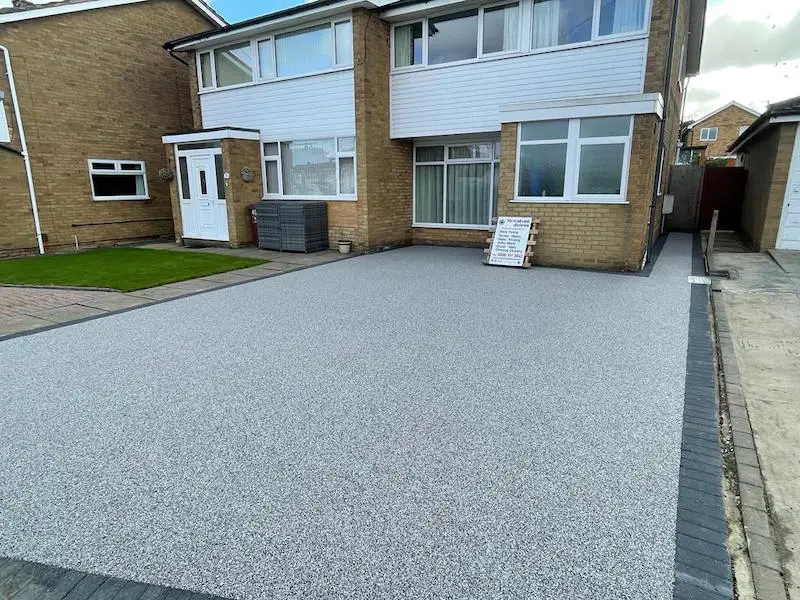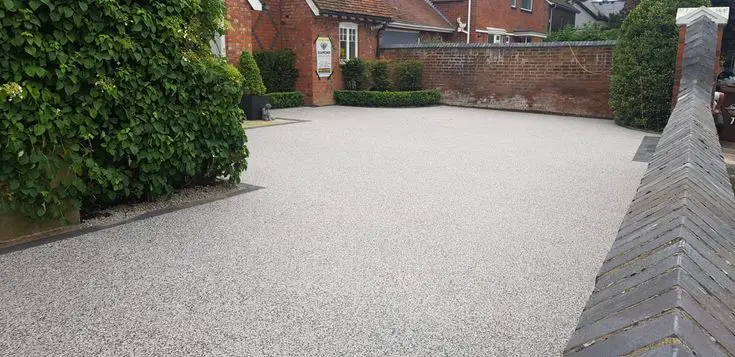
If you’re considering upgrading your driveway, resin driveways are an increasingly popular option.
Not only are they visually appealing, but they also offer excellent durability and low maintenance.
However, before diving into the world of resin driveways, it’s crucial to understand the cost, benefits, and other essential aspects to ensure a successful project.
How Much is a Resin Driveway in the UK?
The cost of a resin driveway can vary depending on several factors. These factors include the size of your driveway, the type of resin used, the complexity of the installation, and your location.
On average, you can expect to pay around £60 to £80 per square meter for a resin driveway.
Here are some examples of driveway sizes and their respective cost estimates:
-
- Driveway Size: 20 square meters
- Cost Estimate: £1,200 to £1,600
Medium Driveway:
-
- Driveway Size: 40 square meters
- Cost Estimate: £2,400 to £3,200
Large Driveway:
-
- Driveway Size: 60 square meters
- Cost Estimate: £3,600 to £4,800
Factors Affecting the Cost of Resin Driveways
- Size of the Driveway: Larger driveways will naturally cost more than smaller ones due to the increased material and labor required.
- Type of Resin: There are different types of resin available, each with varying costs and performance characteristics.
- Complexity of Installation: If your driveway has intricate designs or requires extensive groundwork preparation, the cost may be higher.
- Location: Prices may differ regionally, with urban areas generally having higher costs compared to rural locations.
Is Investing in a Resin Driveway Worth It?

Investing in a resin driveway can be worth it for many homeowners due to the numerous benefits it offers.
Resin driveways provide an attractive, durable, and low-maintenance solution that can enhance the overall appearance and functionality of your property.
Here are some reasons why it may be worth spending on a resin driveway:
- Visual Appeal: Resin driveways offer a sleek and modern appearance, creating an inviting entrance to your home.
With a wide range of colors and finishes available, you can customize the design to match your style and complement your property.
-
Durability: Resin-bound surfaces are highly durable and resistant to cracks, potholes, and weeds.
- Low Maintenance: Compared to traditional driveways like concrete or tarmac, resin driveways require minimal maintenance.
Regular sweeping and occasional power washing are usually sufficient to keep the surface looking clean and pristine.
- Permeability: Resin-bound driveways are permeable, allowing water to drain through the surface.
This feature reduces surface water runoff, which can contribute to sustainable drainage solutions and help prevent flooding.
- Smooth Surface: Resin driveways provide a smooth and even surface, making them wheelchair and pushchair-friendly.
This characteristic also adds to the comfort and safety for pedestrians and vehicles alike.
- Quick Installation: The installation process for resin driveways is relatively fast compared to some other types of driveways.
Depending on the size and complexity, the driveway can often be completed within a few days.
- Longevity: With proper installation and maintenance, resin driveways can last for many years, making them a long-term investment that adds value to your property.
Choosing the Right Resin for Your Driveway
When selecting the type of resin for your driveway, consider factors such as UV stability, durability, and the appearance you desire.
The two primary types of resin used for driveways are:
- Resin-Bound: This type involves mixing aggregates with resin and then applying it to the driveway surface. It provides a smooth finish and is suitable for decorative purposes.
- Resin-Bonded: In this method, a layer of resin is applied to the driveway surface before scattering loose aggregates over it. It offers a textured finish and is more slip-resistant.
Preparation and Installation Process
Proper preparation is essential for a successful resin driveway installation. The process typically involves the following steps:
- Excavation: The existing surface is removed to create a stable base.
- Sub-Base Installation: A suitable sub-base, such as MOT Type 1, is laid to ensure proper drainage and prevent subsidence.
- Edging: Edging is installed to provide a clean boundary for the resin surface.
- Resin Application: The chosen resin type is mixed with aggregates and troweled onto the prepared surface.
- Curing: The resin surface is left to cure and harden, usually within a few hours.
Maintenance Tips for a Resin Driveway
- Regular Cleaning: Sweep the surface regularly to remove debris and dirt.
- Avoid Harsh Chemicals: Use gentle, non-abrasive cleaning agents to preserve the resin’s integrity.
- Address Stains Promptly: Clean oil spills or stains immediately to prevent permanent discoloration.
- Resealing: Periodically, the resin driveway may require resealing to maintain its appearance and protection.



Comments are closed.